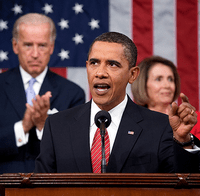Last week, President Barack Obama released his first National Security Strategy. Analysts and observers have focused much of their attention so far on how the new NSS breaks from the one formulated by the Bush administration. By this argument, Obama's NSS represents a new direction both by "counting more on U.S. allies" than former President George W. Bush did, and by repudiating Bush's unilateralism.
In reality, the document does neither of these things. To be precise, it uses words like "diplomacy" and "allies" at statistically the same rate as Bush's 2006 National Security Strategy and still claims that America "reserve[s] the right to act unilaterally if necessary to defend our nation and our interests." But these points are minor, and serve to distract from the most significant aspects of Obama's NSS.
More-astute observers have had a difficult time characterizing the strategy document, mainly because it is quite long compared to past national security policy declarations and, in many regards, appears similar to them in substance. But when you drill down into the text, word by word, it becomes clear that the NSS reveals a lot both in what it doesn't say on important subjects, as well as in what it does say on others.

